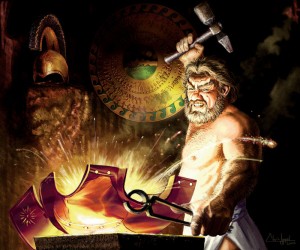 Hephaestus (Vulcan) Greek God - Art Picture by Chris Appel
Hephaestus (Vulcan) Greek God - Art Picture by Chris AppelThe Olympian gods that were crafted by the ancient Greeks in human form and body, distinguished for their exceptional beauty. Their hair and face was beaming and their form could enchant and relax even the wildest beasts of nature. Their bodies were perfectly molded with the finest proportions. However, among them lived another god that although he had divine power and immortality, looked nothing like the rest. That was Hephaestus (Vulcan), god of fire, volcanoes and metalworking. His ugliness sometimes caused the laughter and taunts of the other gods, which was often leaving him with a strong feeling of bitterness.
Hephaestus was presented with thick and long beard. He was very dark in the face, with thick and ugly features. Moreover, he was short and thick, with weak legs that could not hold his weight easily. He had a shaggy chest and his arms were huge by the continuous work in his workshop. He was also lame, having one foot crippled.
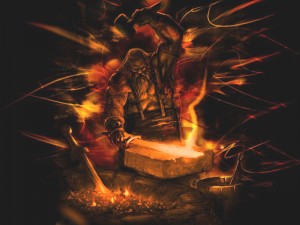 Hephaestus (Vulcan) Greek God - Art Picture by HardCoreDesigns
Hephaestus (Vulcan) Greek God - Art Picture by HardCoreDesignsHephaestus was the son of Zeus and Hera. According to a Greek myth, Hera bore him before she was even made the lawful wife of Zeus, from the love affair that she had with him. Other myths are telling us that Hera gave birth to Hephaestus without an intervening male element, just as Gaia had given birth to her firstborn children. The goddess gave birth to Lemnos Island and then entrusted him to Kidalionas, a blacksmith from Naxos Island. The new god learned from him how to forge and work on metals.
There are many and varied explanations about the first years of the Greek god’s life and the disability his leg was facing. A myth tells us that Hera, just after giving birth to Hephaestus on Mount Olympus, asked to see her baby. Nevertheless, once they presented to her the lame and blackish infant, she was furious. How could a beautiful goddess like her, give birth to such an ugly baby?
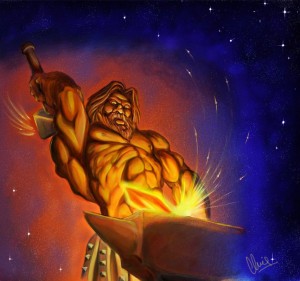 Hephaestus (Vulcan) Greek God - Art Picture by veritas71
Hephaestus (Vulcan) Greek God - Art Picture by veritas71Hera thought that there would not be a way to face the taunts and the ironic laughter of the other gods. Therefore, being mad and furious grabbed the baby and threw it from Mount Olympus. Hephaestus dropped to the Ocean. There, Thetis and Eurynome found him and took him with them. Hephaestus spent with them the first nine years of his life in a sea cave, the palace of Nereus. Hephaestus was making wonderful jewelry with corals and pearls and was giving them as gifts to the goddesses who protected him. In that way, he showed them his love and gratitude.
Another Greek legend about Hephaestus, tells that the unfortunate event concerning his leg happened later in his life. It was a day like many others that the divine couple, Zeus and Hera, was quarreling. The voices of the goddess resounded in the whole Olympus and caused the comments of the other gods. Hera could not imagine how her husband managed, despite her efforts to monitor him continuously, to conclude sexual intercourse with a mortal, Alcmene. The worst of all was that he acquired a son with her, Heracles (Hercules).
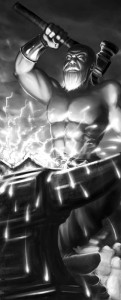 Hephaestus (Vulcan) Greek God - Art Picture by Alayna
Hephaestus (Vulcan) Greek God - Art Picture by AlaynaZeus began to twinkle and thunder from his anger, since he could not stand the sickening jealousy of Hera. The poor Hephaestus took the side of his mother in this furious fight. His father then, blurred as he was in rage, grabbed his ugly son, who never really liked, and threw him with all his strength down from Mount Olympus. Hephaestus swirled in the air for a whole day and eventually was smashed in Lemnos Island. His body banged hard on the rocks of the island and then Hephaestus was lame, having a crippled foot for his entire life.
Generally, the early years of his life Hephaestus lived away from Olympus and either alone or with the help of a teacher became the first craftsman among the gods. His parents did not ever face him as an equal with the other children. Hephaestus was kind-hearted and patient, but was always thinking about his parents' behavior and was very frustrated. Often driven by his grievance, there were many time that he took his revenge.
The Greek god’s behavior towards his mother is presented with two different forms. In the Iliad, on two different occasions, we are witnessing a perfect loving relationship between mother and son.
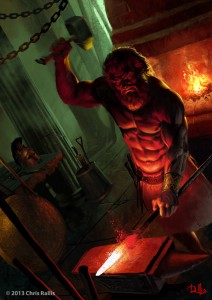 Hephaestus (Vulcan) Greek God - Art Picture by Chrisra
Hephaestus (Vulcan) Greek God - Art Picture by ChrisraIn one case, Hera asks Hephaestus to help Achilles in his duel with the river Scamander. It is indeed one of the few cases where we see the god in all his divine glory. He spreads his flames to the entire camp and burned also all the dead bodies of warriors. The fiery flame then greedily devours vast areas of forest and immediately makes its final assault. The flame rushes rapidly on the river. The river Scamander despite his liquid form cannot resist the fiery whirlwind. The waters begin to boil and evaporate. The riverbed is drying out and with heartbreaking words, he asks for Hephaestus’ mercy.
In the second case, we watch Hephaestus comforting his mother with the sweetest words, after a terrible quarrel with Zeus. He asks Hera to show submission to her husband, the father of gods and men, and to coax him with beautiful words.
On the contrary, there is a funny fable showing Hephaestus avenging his mother for her initial behavior towards him. Once that Hera had her name day celebration and there was a big party on Mount Olympus, Hephaestus gave her a golden throne.
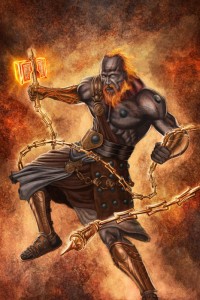 Hephaestus (Vulcan) Greek God - Art Picture by Elder_of_the_Earth
Hephaestus (Vulcan) Greek God - Art Picture by Elder_of_the_EarthFor two whole months, Hephaestus put all his art to achieve the best result. He dug up images and representations of the feasts of the Greek gods and their daily life. Hera was really impressed by the gift of her son and tried it immediately. She sat proudly on the throne for a long time and was discussing with the other gods. However, when she wanted to get up, she discovered with a great surprise that this was impossible. Hephaestus had placed invisible shackles preventing her from leaving the throne.
“This, my sweet mammy is my gift to you to repay the love you showed me when I was born. Was it my fault that I was born ugly and with dark skin and you threw me from Mount Olympus?”
Hera asked for forgiveness with tears and begged him to release the invisible shackles. All the gods took her side and began to quarrel with Hephaestus. Ares, the god of war, who was also Hera’s son, was very angry too. He rushed to Hephaestus to convince him by force, but his brother had already grabbed a lighted torch and hurled it against him. Ares was very scared and hid himself among the goddesses. Then, Hephaestus left for Lemnos, which was his favorite island, leaving the other gods speechless, who barely restrained their laughter watching Hera in this comical situation.
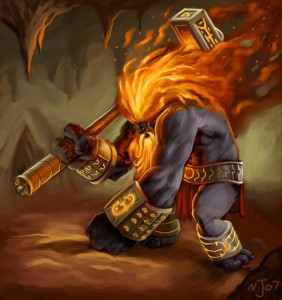 Hephaestus (Vulcan) Greek God - Art Picture by TaekwondoNJ
Hephaestus (Vulcan) Greek God - Art Picture by TaekwondoNJDionysus, dear friend of Hephaestus, undertook the task to save the situation. He immediately went to Lemnos, in the workshop of the god, and found him at dinnertime. He sat together to eat and sent a satyr to bring wine from his vines. Dionysus managed to drunken Hephaestus and convinced him to return with him to Olympus and release Hera from her shackles. After some time they both arrived in front of other gods riding a mule. Zeus just after seeing his son told him angry.
“Come on, then, Hephaestus, the joke went too far. Quickly release your mother!”
Stuttering from drunkenness, he said that would release Hera only if Zeus promised that would fulfill his wish. The king of the gods, unable to do otherwise, accepted Hephaestus’ term. Hephaestus released Hera and immediately asked Aphrodite for his wife. All the gods were surprised. The ugliest god would marry the goddess of beauty! Nevertheless, Zeus could not do otherwise, because he had sworn an oath. The face of Aphrodite darkened, but could not to resist the will of her father. Therefore, she reached out her hand to Hephaestus. Of course, the goddess of beauty was not the most faithful wife.
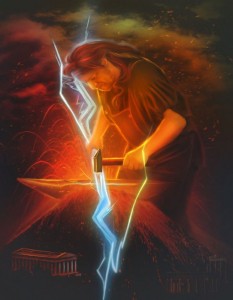 Hephaestus (Vulcan) Greek God - Art Picture by Alexa_Asta
Hephaestus (Vulcan) Greek God - Art Picture by Alexa_AstaThe relations of Hephaestus and Zeus were relations of respect and submission. Hephaestus always performed willingly the orders of his father. Additionally, he feared his father a lot.
The Greek god helped Zeus in the War with the Giants and made countless gifts. By his father’s order, Hephaestus created Pandora from the soil and contributed to the punishment of Prometheus, nailing him in the Caucasus as prey for a vulture, which was devouring his chest.
Homer tells us that the divine blacksmith had rigged his studio on Mount Olympus. Therein he was spending his entire day, creating items using his tools, hammer, anvil and bellows. The workshop was fully equipped. Twenty kilns were constantly burning, while with the god’s order the flames turned bigger and dispersed so much heat as necessary for the builder to process the copper, silver and gold.
Hephaestus made too many constructions for himself but also for many gifts to the gods. Firstly, his palace was resplendent. The whole palace was of solid gold, carved and wrought so much, as the best artisans of the world could not construct, even if they worked throughout their entire lives for this cause. It was filled with various ornaments made of sapphires and diamonds.
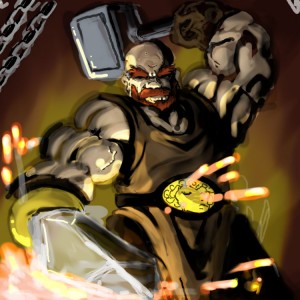 Hephaestus (Vulcan) Greek God - Art Picture by Cabal_Art
Hephaestus (Vulcan) Greek God - Art Picture by Cabal_ArtThe most fantastic of all his creations were the golden statues that he built to serve him. These statues had the form of young girls and Hephaestus had given them strength, thought and life. They were his inseparable companions, always following him everywhere. They followed him even in the assemblies of the gods and helped him stand up when he was getting tired.
Hephaestus built all the majestic palaces of Olympus and the gods gave him priceless gifts. He donated the auspices and the scepter to Zeus, the sickle to Demeter and Apollo and Artemis their arrows. In Helios (Sun) gave the shining chariot which constantly crossed the sky and to Dionysus a golden cup. In his dressy wife, he gave extremely precious necklaces and other jewelry with rare gems, as well as a golden mirror. Aphrodite always carried this golden mirror with her. Another of Hephaestus’ inspirations was the magic tripods that gave to the gods. When the Greek gods assembled to make a serious decision, the tripods automatically took place behind every god. Once the meeting ended, each tripod was immediately transported to its holder’s palace.
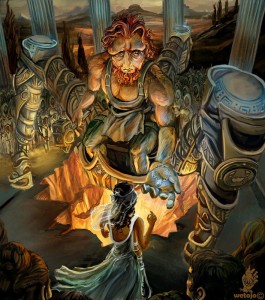 Hephaestus (Vulcan) Greek God giving a gift to Aphrodite - Art Picture by Wetojo
Hephaestus (Vulcan) Greek God giving a gift to Aphrodite - Art Picture by WetojoThe divine blacksmith was generously giving gifts to mortals also. So he gave Heracles a golden breastplate, to Ariadne a garland made of precious metals and gems and to Cadmus a necklace for his marriage to Harmony. Hephaestus donated two wild bulls to Aetes that breathed fire from their nostrils and had bronze feet. He also gave silver dogs to Alcinoos to guard his palace. Amongst his most important constructions are the weapons of Achilles, upon request of Thetis. Homer spends half rhapsody to describe the resplendent shield that had the form of five concentric circular disks. Hephaestus painted on this shield the entire life of gods and humans.
First of all, he made the primary elements of nature: Earth, Heaven, the Sun and the Ocean encompassing everything. Then he painted all the stars of the sky, Pleiades, Hyades, Orion and Ursa. He also represented scenes like a wedding ceremony, a trial taking place in the market and battles at the walls of a besieged city. Immediately after, Hephaestus painted softer scenes that normally take place during peacetime, like the harvest and the vintage, but also white sheep grazing in a green meadow beside shepherd stalls and huts. Next scene was a dance performance. Teens and young girls wreathed with flowers and dressed in lavish clothing and long tunics. Amongst them, the divine singer, Apollo, played his lyre and regulated their footsteps.
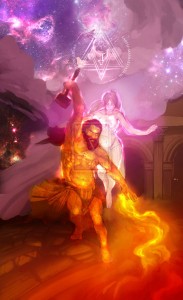 Hephaestus (Vulcan) Greek God with his wife Aphrodite - Art Picture by xviisideris
Hephaestus (Vulcan) Greek God with his wife Aphrodite - Art Picture by xviisiderisThe ancient Greeks usually imagined Hephaestus as a simple worker in his workshop with smoke-begrimed face and soaked in sweat. The Greek god always wore a short sleeveless tunic to avoid trouble in his movements. When he finished his chores or urgently needed to go to gatherings of the gods, extinguished the fires of the kilns, gathered his tools in a silver box, drained his sweat with a sponge and wore a golden robe.
Some legends say that Hephaestus' workshop was not on Olympus, but in Lemnos Island. They even believed that it was inside the island's volcano. The flames and vapors coming out of the crater came from the forges of the god and the muffled noises were coming from the blows of the hammer with which Hephaestus gave wonderful forms in the precious metals he was processing. Generally, the connection of Hephaestus with Lemnos is pervasive in all myths and his cult was particularly widespread at this island.
The erotic adventures of the god compared to the other Olympians were scarce. Although Hephaestus was the ugliest of all gods, according to tradition, had the most beautiful wives. Iliad, Haris (one of the Graces) who was the personification of beauty is appointed as his wife.
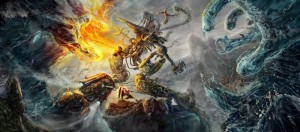 Hephaestus (Vulcan) Greek God saves Achilles - Art Picture by ertacaltinoz
Hephaestus (Vulcan) Greek God saves Achilles - Art Picture by ertacaltinozHesiod mentions Aglaia as his wife, the youngest of the Graces. However, Hephaestus' most famous wife was Aphrodite. Of course, Aphrodite could not resist for long to remain faithful to her husband. She was captivated very soon, by the beauty and perfect physique of warlike Ares and became his mistress. The god of sun, Helios, monitors everything riding on his chariot. When he saw Ares and Aphrodite, lying on the bed of Hephaestus in his own palace, immediately ran to the divine artisan to reveal it. Then, the Greek god asked Helios not to reveal to anyone else this secret and thought of a plan. He stretched out on the bed an invisible net.
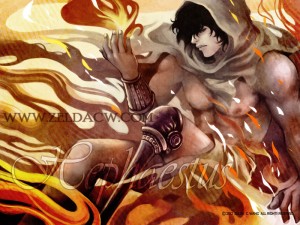 A more beautiful approach on Greek God Hephaestus - Art Picture by Zeldacw
A more beautiful approach on Greek God Hephaestus - Art Picture by ZeldacwTherefore, the next time the two lovers met and lied down on the bed were tangled in the net. Ares and Aphrodite were desperately trying to set themselves free. Nevertheless, the more they tried, the more they were being entangled. When Hephaestus returned to his palace, saw the illegal mates naked and immobilized onto the bed. They were so ashamed that could not face him. Filled with rage and grievance, Hephaestus broke out on Ares that although he was his brother did not hesitate to betray him. He also scolded his wife, who did not appreciate all the love and care he was giving her.
To get his revenge he called Zeus and the other gods and showed the shameless lovers who were still tangled in the magic nets. All the gods blamed the unfaithful wife and the heartless brother and swore them for their sin. Only that scene managed to calm the wrath of Hephaestus and he finally freed them. Aphrodite, ruddy from shame, ran away and all the gods were continuously laughing.
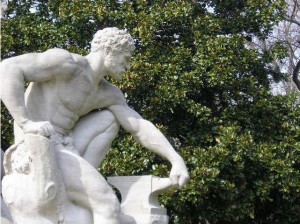 Hephaestus (Vulcan) Greek God Statue - Picture by Ascachilwen
Hephaestus (Vulcan) Greek God Statue - Picture by AscachilwenAfter Aphrodite's infidelity, Hephaestus turned elsewhere. He longed very much for Athena. The Greek god's help was decisive in Athena's birth. Some day that the war goddess went to his workshop to order him a new armor, the divine craftsman swooped up and tried to rape her. Athena, who symbolized the eternal chastity, fought with him and managed in the end to elude him. Nevertheless, after eluding him, she saw that there was Hephaestus' semen left on her knees. Athena took the sperm with a piece of cloth and flew it on Earth. Thus, Erichthonius was born and Athena treated him like her real son.
According to another myth, Hephaestus mated with Kabiris, the daughter of the sea god Proteus. From this relationship, he had three sons, Kabeirous. He was also father of one of the most famous bandits of antiquity, Perifitis. He killed all those passing by with a huge bat until much later he was killed by Theseus. Pilios is also mentioned as a son of Hephaestus, who healed Philoctetes in Lemnos. According to other Greek myths, his sons also are the Argonaut Palaimonas and Ardalos, a legendary sculptor who like Palaimonas had inherited from his father the artisanship and dexterity at hands.
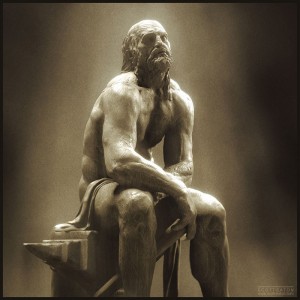 Hephaestus (Vulcan) Greek God Statue by Scott Eaton
Hephaestus (Vulcan) Greek God Statue by Scott EatonHephaestus was the god of volcanoes. Therefore, he was connected with all the volcanic regions of the Mediterranean. There was indeed a legend referring to the feud with Demeter to the possession of Sicily. This dispute was resolved with the intervention of Etna, daughter of Briareus, who lends her name to the mountain.
Moreover, under this mountain the last opponent of Zeus was buried, the terrible Typhon. Hephaestus sat on the mountain in order to prevent him from escaping. Other Greek legends tell that the god of fire, in order to immobilize Typhon, hung on his neck a huge anvil.
Hephaestus was for the ancient Greeks, the personification of fire, so that helped the human race in its early stages, of course with the mediation of Prometheus. The Greek god is rarely presented using the fire as a destructive medium. He usually used fire as a means of working on precious metals. Therefore, all the craftsmen and blacksmiths highly regarded him as their patron.
The divine blacksmith was probably a bit mislaid over Olympus but revered among men. Hephaestus symbolized the civilizing power of fire and protected the metallurgy and artisans. His symbols were the hammer, anvil and tongs.
Please leave a comment if you liked this article 🙂
All pictures are also uploaded in Albums on the Greek Mythology Pantheon page on Facebook, visit us at :


12 COMMENTS
I am in 6th grade and i was doing a greek god project, this helped me so much. thanks!!!!!!!
I also have a project I’m doing and I didn’t know he married venus.one of the most ugly god married the goddess of beuty. wow!
This helped a lot. Thanks for the creator, I got my project done.
I´m also doing a project, and this was very helpful. Thanks!
I got some facts about it thanks.
THX really really helpful because got project in 6th grade from Mr. Jenkins
i was here for a greek research project it didn’t help me all the way but its helped me half of the way and was cool
okay fank u
I am ding a volcano project so this is going to help because we have to use Hephaestus as the God and this article helped me a lot
From what I’ve read, his Roman form, Vulcan, was more linked to the destructive side of fire, perhaps because of Italy’s experiences with the power of Vulcanoes and fire. He is also as I understand the God of Bakers and Cooks and seen as a fertility God, fertilizing various Goddess and mortal women in Roman Mythology.
hello
cool